- Home
- Patricia Highsmith
A Dog's Ransom Page 2
A Dog's Ransom Read online
Page 2
DEAR SIR:
I HAVE YOUR DOG LISA. SHE IS WELL AND HAPPY. BUT IF YOU WANT HER BACK LEAVE $1,000 (ONE THOUSAND DOLLARS) BETWEEN ELEVENTH AND TWELFT PIKES OF FENCE EAST SIDE OF YORK AVENUE BETWEEN 61 & 62 ST. FRIDAY NITE AT 11 P.M. IN NEWSPAPER WRAPPING IN BILLS OF NOT BIGGER THAN TEN DOLLARS. IF YOU DON’T LEAVE THIS MONEY THE DOG WILL BE KILLED. I GATHER THE DOG IS IMPORTANT TO YOU? WE’LL SEE! A NICE LITTLE DOG. MAYBE NICER THAN YOU.
ANON
LISA WILL BE TIED TO SAME PIKE ABOUT ONE HOUR LATER. NO COPS PLEASE—OR ELSE.
So there it was. The nightmare had come true, Ed thought—a phrase that reminded him of clichés in the not very good books he sometimes had to read. He let himself into the apartment.
“Eddie—”
Ed supposed he was white in the face. “Well, I know where Lisa is. My dear, I could use a neat scotch—despite the hour.”
“What’s happened? Where is she?”
“The poison-pen guy has her.” Ed went to the kitchen, bent over the sink and with his free hand splashed water on his face.
“He wrote another letter?” Greta brought a scotch in a tumbler.
“Yes. He wants a ransom by tonight. A thousand dollars.”
“A thousand dollars!” Greta said in a tone of astonishment, but Ed knew it wasn’t the sum so much as the crazy situation that shocked her. “Should we do it? Where is she?—Who is he?”
Ed sipped the scotch and held on to the sink. The crumpled letter was now on the drainboard. “I’ll have to think.”
“A thousand dollars. It’s insane.”
“This guy’s insane,” Ed said.
“Eddie, we’ve got to tell the police.”
“That’s sometimes the way to lose something—something kidnapped,” Ed said. “If the fellow gets scared—I mean if he sees police waiting for him—” But a plainclothesman, Ed thought, with a gun, might be different. Telling the police might not be a bad idea.
“I want to see the letter.” Greta took it and read it. “Oh, my God,” she said softly.
Ed had a vision of Lisa breaking away from the leash or whatever Anon was holding her with, running to him on the dark sidewalk of York Avenue at 61st Street tonight at midnight. What made sense? Should he get the money? The returning of the dog one hour later, written at the bottom of the letter, seemed an aftermath, something Anon might not mean.
“Darling you should get the police to watch that spot and don’t fool around with the money,” Greta said earnestly.
“If we get Lisa back, isn’t it worth a thousand dollars?”
“Of course she’s worth it! That isn’t the point! I’m not trying to save a thousand dollars!”
“I’ve got to think about it. I’d better get to the office.” He was thinking, if he got the cash, he would have to go to the bank before 3 p.m. He felt he would go to the bank. He could always decide about the police after he got the money. Ed wished, not for the first time, that he was a type who became angry quickly, made a decision quickly, based on the right, as he saw it. Even if such a person were occasionally wrong, he had at least acted, decided, because of what he thought right. I hesitate, without any of the eloquence of Hamlet, Ed thought with a faint amusement, but he did not smile.
“Will you telephone me this morning?” Greta asked, following him to the door.
Ed realized she was physically afraid here in the apartment. And what was more logical, because Anon probably knew Greta by sight as well as himself. Ed had an impulse to stay home. He said with difficulty. “Don’t go out, darling. And don’t open the door to anyone. I’ll speak to Mark downstairs. I’ll tell him not to let anyone up to see you. All right? Do you have to go out for anything?”
“No. I had sort of a lunch date with Lilly, but I can cancel it.”
“Cancel it. I’ll call you during the morning. Bye-bye, darling.”
That morning, during a Publishing Committee meeting—which was so full of agenda it would be resumed in the afternoon—half Ed’s mind was on the Lisa situation. By 11:30 a.m. he had decided that to have a plainclothesman, who might insist on trailing Anon after he collected the money, would jeopardize Lisa’s life: Anon might realize he was being trailed and be afraid to return an hour later with the dog, or to have anyone else bring the dog. So when Ed telephoned Greta just before he went out to lunch, he told her that he had decided to get the money and to have no police. Greta was still in favor of a plainclothesman.
“If we lose, we’ve lost only a thousand bucks, darling. I mean if we can’t identify him later and so forth. There’s more chance of losing the other way—losing the dog.”
Greta sighed. “Could you telephone me again this afternoon, Eddie? I am worried.”
“I’ll call you twice if I can.”
He and Greta had four letters from Anon now. If he took them to the police, which he certainly intended to do eventually, the police might have in their files letters to other people from the same Anon. Identifying printing was just as easy as identifying script writing. If Lisa were dead or alive, Anon would be found and stopped. Even his own letters were bound to provide a clue. And yet—just how exactly?
After a quick lunch alone at the Brass Rail on Fifth Avenue, Ed walked to his bank and withdrew a thousand dollars in ten-dollar bills. He had foreseen the bulk and brought his black briefcase. As he left the bank, Ed wondered if he was being watched even now by Anon? Ed did not glance at anyone on the street and made his way at a moderate pace back to his office. It was a fine, crisp day full of sunshine. He wondered if Lisa were outdoors or in at this moment? Surely she’d bark, surely she was unhappy and mystified. How had the bastard grabbed her? How? It was quite possible she was dead, Ed realized.
When Ed came home, with the briefcase, Greta said she had had no telephone calls other than Ed’s and one from Eric who wanted to know the news about Lisa.
They had a simple dinner. Greta was depressed about the money, and didn’t want to look at the briefcase. But she wanted to go with him at 11 p.m. Ed tried to dissuade her. Where would she wait for him?
“Oh, there are bars on York Avenue. Or Third. I’ll order a drink. I’ll ask Eric to come. Sure!” she interrupted his protest. “Why not? What’s the harm? Do you think I want to leave you alone with this bastard?”
Ed laughed for the first time since Lisa had disappeared.
Greta telephoned Eric, who was nearly always in. Ed had not been able to stop her from telling Eric his mission, and maybe it wasn’t a bad idea, Ed thought, if Eric came.
It was ten to 11 p.m., when Ed went out the door of a bar on Third Avenue and 60th Street, leaving Greta and Eric on their scotch and sodas. He carried the newspaper-wrapped parcel under his left arm. The parcel was held by two big rubber bands. He was to rejoin Greta and Eric in about fifteen minutes—and Ed did find it comforting to have a date with them. He walked slowly, but not too slowly, eastward, and at York Avenue crossed to its east side and continued north. He was not anticipating a physical encounter, but one never knew with a psychopath, he supposed. However, he pictured Anon as a short fellow, fortyish, maybe even fifty, a weakling, a coward. Anyway, Ed was five feet ten, sturdily enough built—in fact he had to watch his waistline—and in college, Columbia University, he had boxed for a year or so, and played football, though neither with much enthusiasm. Ed took a breath and walked straighter. Now he could see the rail fence across 61st Street.
Ahead of him, a slender figure of a young man walked, hands in coat pockets, away from Ed, northward. Trees along the curb shaded the sidewalk from the street lights. Behind the rail fence was some kind of medical research center, Ed recalled vaguely. Ed glanced behind him, and seeing nothing to worry about, began to count off the pikes. Between the eleventh and twelft (he remembered the spelling) he stuck the newspaper-wrapped bundle, pushing it so that nothing of it projected, yet it was ri
ght there, not in danger of falling to the ground behind, but resting on the cement.
Ed turned, and feeling that this was no time to look around if he was to be a good sport, retraced his steps towards 60th Street and crossed discreetly with the light. He entered the red-neon bar casually.
Greta waved to him with a gleeful face from a booth on the right. Eric half rose, beaming to see him back.
“Nothing at all,” Ed said as he sat down beside Eric. Suddenly all his muscles ached.
Greta was gripping his forearm. “You didn’t see anything? No one?”
“No one.” Ed sighed and looked at his wrist-watch. Five minutes past eleven. “Be nice to have a scotch.”
“A double!” Eric said gaily.
A single, Ed thought, then reflected that he could make a double last a long time with water. He had nearly an hour to wait.
Ed hardly listened to what Eric and Greta were saying. Greta was talking about seeing Lisa tonight, and Ed realized from her confidence that she was either feeling her drinks or was a bit hysterical. Eric was optimistic, and the same time trying to be sensible: “You can’t tell with psychotics. It is foolish to be over confident. Wahnsinnig! What a crazy story!”
Yes, Ed thought, and Eric looked as entertained as if he were watching a TV show instead of being present at something real. Ed kept glancing at the wall clock, which seemed to be stuck at 11:23, so he stopped looking at it. Now Greta was spinning out her own drink with water. She believed she would see Lisa tonight. Ed could see that. She had been very stoic, or brave, since Wednesday night: not a sentimental word in regard to Lisa. All bottled up, Ed thought. She adored Lisa as much as he. And maybe Anon would be a good egg, and have Lisa tied to the rail by two minutes to midnight. Ed was going to appear on the dot of midnight and not before. Even if he saw Anon, and took the dog’s leash from his hands, Ed thought, he wouldn’t try to remember Anon’s face so that he could run him in. No, he’d be too glad just to see Lisa again. Ed found himself grinning at a joke Eric had told Greta, which Ed hadn’t even listened to.
“We are watching the clock,” Eric said in his smiling, precise way.
The minutes before midnight went swiftly. Ed stood up at six minutes to twelve.
“See you soon again!” Ed said.
Greta’s face looked strained, not hopeful now. “You’ll come back when?” she demanded.
“Twelve-twenty at the latest,” Ed said for at least the third time. They had arranged that if Lisa wasn’t there, he was to return and tell them, though Ed was prepared to go back and wait longer. Eric and Greta had of course wanted to accompany him to get Lisa, but Ed thought it a bad idea, because Anon might notice them (however much they tried to make themselves inconspicuous) and veer away.
Ed walked more quickly now, and only on the east side of York slowed up and peered ahead in the darkness. He was trying to see the black four-legged dot of Lisa near the fence, perhaps alone and straining first in one direction then the other to see who was coming to untie her. It was too dark to see anything really, and when Ed paused to read his watch under a streetlamp, he saw it was only three minutes to midnight. He stopped in the block between 61st and 62nd Streets, leaned on one hand against a tree, and waited. How easy it was to wait now. Anon ought to blow himself to a taxi, and maybe he had done, and got out north of here, and was walking Lisa downtown. Just as likely the reverse, Ed thought, and quickly turned to look downtown. Nothing on the east side of the pavement that he could see. He looked across the street and his heart gave a jump at a dog on a leash, but it was a white dog of some kind, led by a woman. Wouldn’t it be odd if Anon were a woman?
It became five past midnight. Ed went closer to the rails where he had left the packet of money, and saw that it was gone. That was splendid! Ed looked up and down for taxis that might be slowing, letting out a man with a dog. He saw none.
At eighteen past, as he had promised Greta, he left his place and walked quickly back to the bar. He raised his hand and smiled a little as he approached Greta and Eric. But he sat down before he spoke. “The money’s gone, but no dog as yet. Sorry.”
“Oh, Eddie,” Greta said. All hope seemed to pour out of her.
“He could be late,” Ed said. “I’m going back, of course.”
“A schnapps first,” Eric said. “A coffee maybe.”
“Oh, no. Thanks.” Ed didn’t want to waste the time. He stood up. “I’ll give it till one.”
“And then it’ll be two, then three,” Greta said.
“We’ll come with you,” Eric said. “If he’s bringing Lisa—”
“I’d better be alone, really, Eric. I’ll be back by one, but I’d better go back now.” Ed walked to the door.
Again the sidewalk by the fence was deserted. It was 12:32 a.m. Ed tried to be calm. Give it till 1 a.m., fine. Maybe there’d been some delay, difficulty in getting a taxi. If the fellow, for instance, lived in Greenwich Village and had to take the money all the way back there—or even uptown west towards Riverside Drive—
By ten of one, Ed began to realize he’d been hoaxed. His eyes smarted from straining. Two minutes to one. Then 1 a.m., and Ed walked restlessly to the corner where he might have crossed York, but he could not bring himself to leave. At ten past one, Ed saw Greta and Eric crossing York Avenue, Ed had thought they might come.
“Nothing?” Greta said when she was still several feet away.
“No. Nothing.”
She gave a groan. “Eddie, it’s a trick.”
“Maybe,” Ed said.
“Where was the money? Show me,” Eric said.
Ed counted off the rails, more or less, and pointed.
“What a bastard! It is disgusting! One thousand dollars. Now I hope you’ll go to the police.”
Ed was still looking into the dark distances, ready to ask Greta and Eric to walk away in case he saw Lisa. Now the presence of Eric and Greta annoyed him.
“Eddie, how long are you going to wait?” Greta asked him.
“I’ll smoke a cigarette,” Ed said. It was his last cigarette. He lit it with his lighter. Suddenly he felt tired and angry. “Yes, I’ll tell the police. You bet I will.”
But when Eric and Greta made a move to leave to find a taxi, Ed said, “Look, I want to wait another half-hour.”
“He knows where to find you if he’s late,” Greta said. “He could telephone us.”
That was true. Ed yielded. It was like defeat, like death, Lisa’s death, as he moved towards the taxi and got into it with Eric and Greta. They dropped Eric off at his apartment building on East 79th Street, then drove homeward.
The telephone was ringing as they entered their apartment, and Ed made a dive for it.
“Hello, Ed. Lilly. Any luck?” she asked eagerly.
Ed let his breath out. “No . . . Yes.” (Yes he had delivered the money.)
“Oh, I am sorry. It’s a criminal act! Definitely!”
“Would you like to speak with Greta?”
Ed wanted very much to ring the police tonight. The police could keep a watch on York Avenue all night, a plainclothesman. But Ed was afraid he couldn’t explain it all clearly enough tonight. He realized he was angry, confused, and very tired. Better to start tomorrow morning early.
3
Ed could not get to sleep, and when Greta became aware of this (though he had been lying motionless), she suggested a sleeping-pill, but he declined it. He wanted to fall asleep with his arms around Greta, but he couldn’t. Everything seemed suspended, unfinished. Greta found his hand, squeezed it and held it. Why was he so badly upset? Well, Lisa’s death, possibly. And the money lost. No, that wasn’t it, they could afford it. It was the evil. It was Lisa’s absence, the emptiness in the house. As when Margaret had died: she had disappeared for four days, and they had rung all her friends whose telephone numbers they k
new. Then from the police had come the news of her death, the news that her body was at the morgue. Ed remembered the silence of the apartment afterwards. Greta had cleared Margaret’s room, the room across the hall from the bedroom, shifted the furniture of the whole house so that everything looked completely different. And still, now and then when he walked past the open door of Margaret’s room (it was now a reading-room, or guest-room, there were two tanks of goldfish in it, Greta’s painting things and her sewing-machine), he felt a shock of loss, as if her death had just happened. She had been in her second year at NYU. Ed had wanted her to go to Barnard, since his school was Columbia, but she’d had more friends from high school going to NYU. Ed remembered expecting the sound of Margaret’s key in the door, expecting her to walk into the foyer, full of energy and news, or hungry, and now it was the same with Lisa’s absence, absurd as it might be. He waited for Lisa to trot in from some room, to look at him and give the grunt-growl which meant it was time to be taken out. Lisa kept track of time better than Ed. Lisa’s bowl of water was still on the floor in the kitchen, and tonight before going out to make contact with Anon, Ed had changed the water because of a compulsion, a compulsion which he had thought might bring bad luck, but on the other hand he didn’t believe in luck.
At some point, he slept.
By a quarter past 8 a.m., Ed was at the precinct station on 109th Street, equipped with the four letters from Anon, each in its proper envelope. Ed was taken to the office of a Captain MacGregor to whom he told his story and showed the letters. The letters were not dated by Anon, but Ed had dated the last two, guessed at the dates of the first two, and written them at the top of the pages. The letters spread over thirty-five days.
MacGregor, a lean man of about fifty with close-cut dark blond hair, looked over the letters while standing at his desk.
“I thought,” Ed said, “you might have had complaints from people who’d received the same kind of letters. From the same man.”

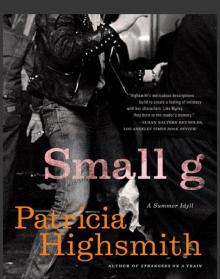 Small G: A Summer Idyll
Small G: A Summer Idyll The Boy Who Followed Ripley
The Boy Who Followed Ripley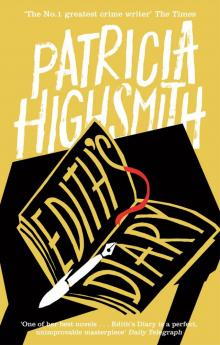 Edith's Diary
Edith's Diary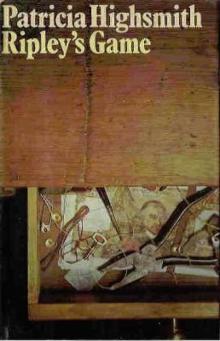 Ripley's Game
Ripley's Game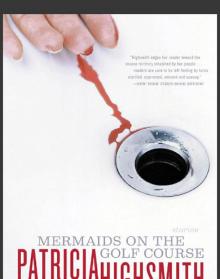 Mermaids on the Golf Course: Stories
Mermaids on the Golf Course: Stories Slowly, Slowly in the Wind
Slowly, Slowly in the Wind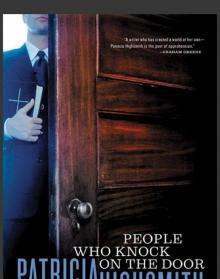 People Who Knock on the Door
People Who Knock on the Door The Glass Cell
The Glass Cell The Blunderer
The Blunderer Those Who Walk Away
Those Who Walk Away A Suspension of Mercy
A Suspension of Mercy Eleven
Eleven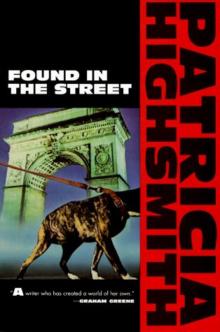 Found in the Street
Found in the Street Ripley Under Ground
Ripley Under Ground The Black House
The Black House The Cry of the Owl
The Cry of the Owl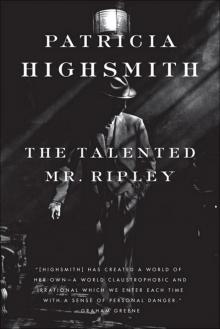 The Talented Mr. Ripley
The Talented Mr. Ripley This Sweet Sickness
This Sweet Sickness The Two Faces of January
The Two Faces of January The Animal-Lover's Book of Beastly Murder
The Animal-Lover's Book of Beastly Murder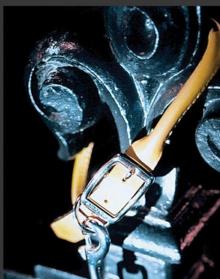 A Dog's Ransom
A Dog's Ransom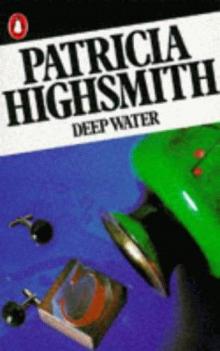 Deep Water
Deep Water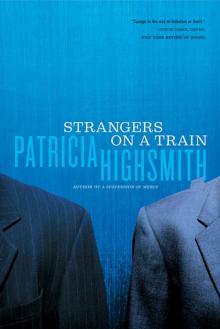 Strangers on a Train
Strangers on a Train Ripley Under Water
Ripley Under Water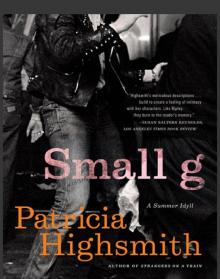 Small g
Small g Nothing That Meets the Eye
Nothing That Meets the Eye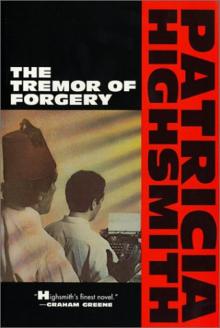 Patricia Highsmith - The Tremor of Forgery
Patricia Highsmith - The Tremor of Forgery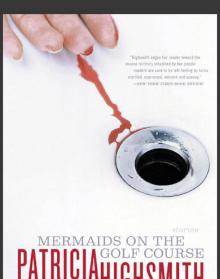 Mermaids on the Golf Course
Mermaids on the Golf Course Suspension of Mercy
Suspension of Mercy The Price of Salt, or Carol
The Price of Salt, or Carol Glass Cell
Glass Cell